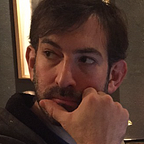How I Accidentally Became the World’s Greatest Fake Russian Troll
It all started on Slate.
I read an article about the intelligence community’s report on Russian interference in the election and posted a comment:
Readers clicked like, and it rose to the top.
Maybe they recognized me. I’ve wasted a silly amount of time commenting on Slate, beginning when I was in grad school (hence the screen name). Maybe the ridiculousness of my comment was obvious to them. Whatever the reason, they realized I was kidding.
David Filipov, however, did not.
Filipov is Moscow Bureau chief for the Washington Post, and his tweet lamenting the poor quality of Russian trolling got a lot of attention.
Now that I think of it, maybe he was shaking his head at Slate commenters’ terrible taste. Or marveling at Russian trolls’ dedication to comment board manipulation.
Either way, his tweet’s been up for only 7 hours and already has a thousand shares.
Retweeters include people who are much more famous than I am, such as…
Esquire columnist Charles P. Pierce, who seems to think it’s real:
Self-proclaimed spokesman of the anti-Trump resistance Keith Olbermann, who seems to realize it’s fake:
Sex advice columnist and “Santorum” definer Dan Savage:
And uberpollster Frank Luntz:
After some responses and a little reflection, Filipov realized the Slate comment must be fake, and bestowed upon me my new title.
I outed myself to Filipov and told him I was kidding.
(I suspect he knew all along. Both my Slate comment and his tweet fall squarely under Poe’s law).
But it didn’t stop there.
#PieFromApples started trending on Twitter.
This one’s great:
Here are my contributions:
Most are joking, but some used the hashtag for serious posts about Russian hacking. And one participant wants #PieFromApples to become a way to call out suspected Russian trolls. (Real ones).
There’s also a new Twitter account, @PieFromApples. Says his name is Dave. Tagline: “I like baseball. Am totally from America.”
So What Does it All Mean?
I’m getting a big kick out of all this, but it also got me thinking.
How many people who saw Filipov’s original tweet believe that Dave is part of Russia’s infamous troll army?
How many who tweeted a joke in response thought they were making fun of a real Russian troll, and how many thought they were playing along with a fake one?
How many who acted as if Dave is real were being ironic?
I have no idea.
And that’s the thing. The uncertainty says something about how weird our fake news/trolling/post-fact media environment has become.
It’s more evidence of something we’re only just beginning to understand. The Information Revolution changed the world.
